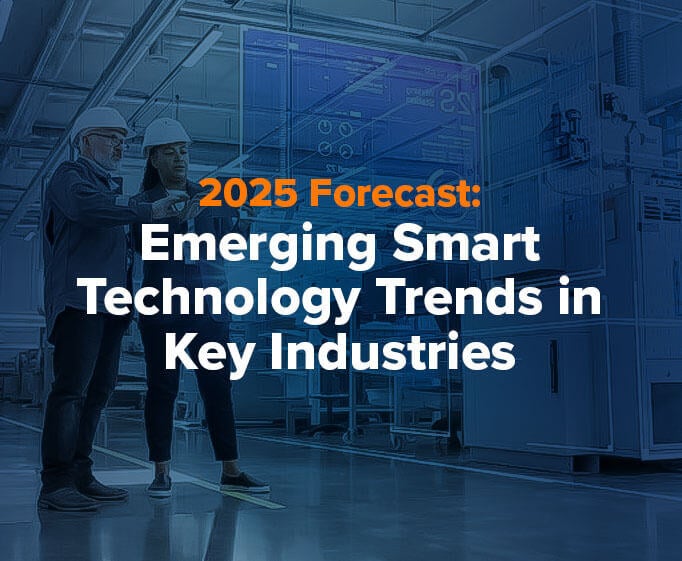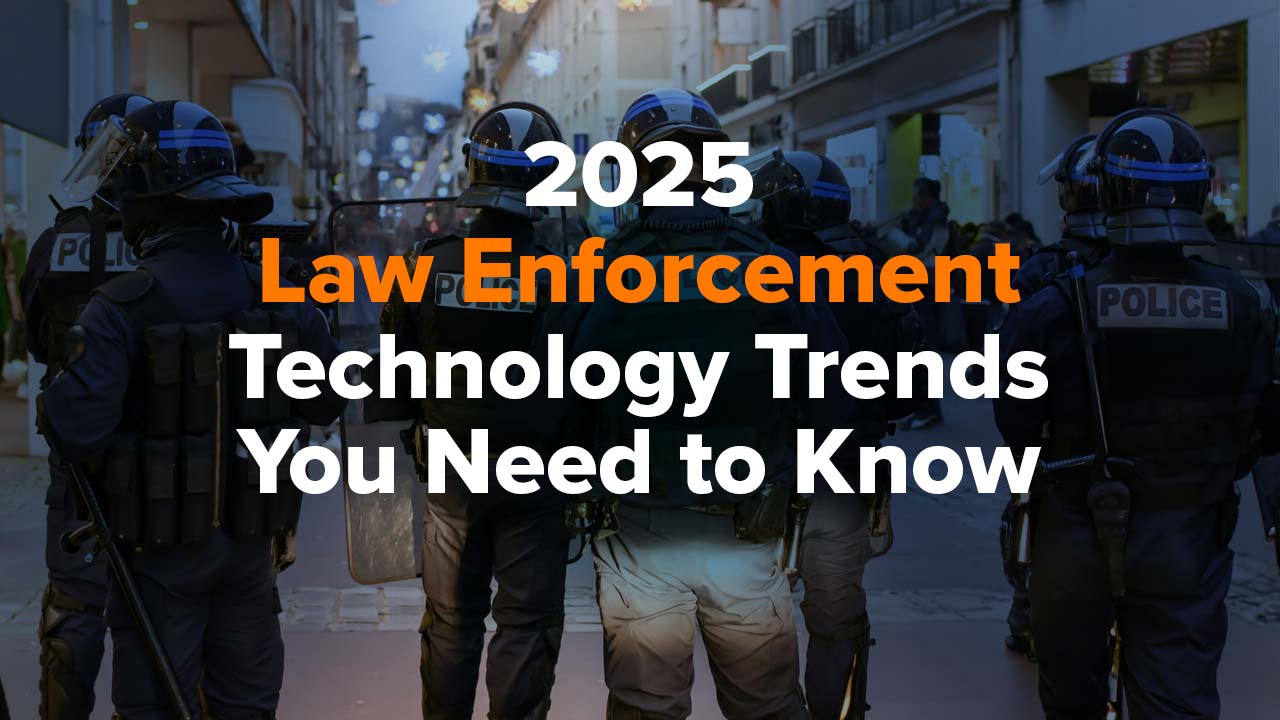By Mike French | January 2, 2025
We’re about to leap into 2025, meaning business and security professionals are gearing up for a new year filled with challenges and opportunities. While we can expect many familiar challenges, changes in society, the economy, and technology will also ensure we’ll face many new ones. While we may not be able to read the future (yet), we can draw on industry expertise to forecast some of the most likely and impactful trends on the horizon.
- Smart Tech Innovations in Warehousing, Manufacturing, and Logistics
- Fleet and Transportation Technology: Trends for 2025
- Correctional Facilities Embrace Smart Asset Management
- Law Enforcement Smart Tech Trends for 2025
- Smart Technology Transforming Education in 2025
- 2025 Technology Trends for Casinos
- Hospitality Industry: Smart Tech to Improve Guest Experiences
- Data-Driven Property Management Trends for 2025
- Municipalities Leverage Smart Cities Technology in 2025
- Four Game-Changing Smart Tech Trends for All Industries in 2025
- Smart Technology Empowers Your Workforce
- Real Time Networks: Smart Solutions for 2025 and Beyond
In this article, Real Time Networks has selected several smart technology trends across different industries that we expect to define 2025. They are drawn from internal expertise and our collaborators in different industries.
Which ones are spot on? Which misses the mark? Let us know!
Smart Tech Innovations in Warehousing, Manufacturing, and Logistics

This sector is grappling with various challenges, including ongoing supply chain disruptions, labor shortages, and market instability, all of which are expected to persist into 2025. Adapting to these challenges is very doable, but manufacturers often favor incremental changes over major, transformative ones. As a result, many leaders feel underprepared for the challenges they see on the horizon, such as adapting to rapid change and closing the skills gaps that risk them falling behind the market when those changes occur.
Some key challenges we expect to see in these sectors include outdated IT and security infrastructure, rising cybersecurity risks from IoT-connected devices, and the need to manage new safety hazards while avoiding costly work stoppages.
In 2025, we expect manufacturers to increasingly turn to smart technologies integrated with advanced sensors to boost their operating efficiency and, just as importantly, stay ahead of the competition. Beyond their efficiency gains, these tools help improve security and safety.
See the full list of warehousing, manufacturing, and logistics trends in our article:
2025 Warehouse Operations Trends: Agility, Automation & Sustainability >
Fleet and Transportation Technology: Trends for 2025
Global forces can impact fleet operations beyond a company’s immediate control. From volatile fuel prices to supply chain disruptions and geopolitical events, fleet managers must be prepared for anything that can disrupt operations and their budgets.
Given this history of uncertainty, in 2025, many fleet managers will prioritize operational sustainability–for example, by transitioning their fleet to electric vehicles (EVs). Automation technologies, such as electronic fleet key management systems, are also gaining traction as tools to streamline operations and enhance security.
Tightening budgets are also pushing managers to find new ways to control costs. Fleet key management systems enable vehicle pooling, which benefits decentralized fleets. These systems allow drivers to securely access vehicle keys anytime they need to. Keys are only released to authorized individuals, and each transaction is automatically logged with a time stamp, eliminating the need for fleet managers to facilitate every transaction.
Correctional Facilities Embrace Smart Asset Management
Security will be the leading reason correctional facilities will implement smart management technology in 2025. However, we expect many will expand the use of these systems for broader operational benefits. One key area of focus will be workforce enablement—equipping staff with the tools and resources needed to perform their roles effectively, securely, and with greater autonomy. Smart technology systems, such as asset lockers, are pivotal in achieving this goal.
Smart lockers provide secure, 24/7 access to critical equipment, ensuring that essential assets are always available when needed. By automating asset access and tracking, these systems reduce the burden on supervisors and free up staff to focus on core responsibilities. Correctional facilities that implement smart technology solutions enhance efficiency and build a more capable, self-sufficient workforce without sacrificing security.
Law Enforcement Smart Tech Trends for 2025

Over the past decade, law enforcement agencies worldwide have come to rely on data gathered by urban infrastructure and officers in the field. Major cities have leveraged data the most, but smart systems capable of collecting valuable data are now more accessible to municipalities of all sizes.
This past year, we explored key trends in smart technology for law enforcement. At the heart of these developments lies an increased use of data and the integration of smart technology to collect, analyze, and act on it effectively. We expect to see an explosion in the use of operational smart technology in 2025 that will support the policing smart systems already in use.
See the full list of law enforcement trends in our article:
2025 Law Enforcement Technology Trends You Need to Know >
Smart Technology Transforming Education in 2025

The adoption of hybrid and remote learning models, alongside advancements in e-learning tools and data-driven strategies, is transforming education at every level, from K-12 to higher education. One overall trend we discussed in our article on education smart tech trends for 2025 is the supportive role AI, robotics, and smart technologies will play. Beyond 2025, we don’t foresee many new technologies displacing teachers and staff, but they will support their work in many different ways.
Educational institutions must embrace technological change to thrive in the coming years. While flexibility has always been a cornerstone of educators' and administrators' skill sets, new challenges demand innovative approaches using all available tools.
See the full list of trends in our article:
Future of Learning: 2025 Smart Tech Trends Every Educator Should Know >
2025 Technology Trends for Casinos
Despite the high-stakes environment, many casinos rely on outdated key control systems. However, in 2025, we anticipate a shift toward more advanced operational and security technologies—especially those with data-gathering capabilities similar to those embraced in other industries.
For casinos, this evolution will likely focus on integrating wireless data collection tools such as RFID (radio frequency identification) technology into key control systems. RFID key control systems automate key transaction management, which leaves no room for human error tracking keys. They use embedded scanners in key cabinets and access terminals to verify keyrings during checkouts and returns.
**Bonus: 10 Best Practices for Casino Key Management
Hospitality Industry: Smart Tech to Improve Guest Experiences

The hospitality industry has been navigating a rapidly evolving market. 2025 appears to present more of the same challenges. Success will hinge on the ability to remain agile and adapt quickly to shifting customer expectations. One key area of focus is improving process control—the ability to monitor and adjust workflows in real time.
For instance, hotels can optimize housekeeping schedules to accommodate last-minute VIP arrivals or adjust service resources based on occupancy levels. To support these efforts, many hotels are turning to smart locker systems to streamline the distribution of essential tools like tablets and smartphones to housekeeping and service staff. The goal here is to reduce inefficiencies and free managers to focus on customers and the guest experiences they want to create.
**Bonus: How to Optimize Hotel Operations Using RFID Tracking for Hotels and Resorts
Data-Driven Property Management Trends for 2025
In 2025, the property management sector will pivot in its use of data. To date, this sector has focused on data gathering–what’s going on at this apartment? Where are maintenance vehicles? Which buildings suffered power outages during a storm? While this is important for operations, there has been less emphasis on analytics and generating actionable insights from data.
Smart technology systems, particularly those leveraging the Internet of Things (IoT), are central to this transformation. Tools like key and asset management systems provide real-time tracking, detailed reporting, and incident management, ensuring seamless control over essential operations.
Emerging IoT advancements will give property managers new or improved capabilities, such as advanced remote control, immediate feedback on physical security, and environmental monitoring. These innovations will enable firms to create smarter, more efficient, safer facilities.
Municipalities Leverage Smart Cities Technology in 2025
In 2025, IoT tech will play a pivotal role in shaping the growth and functionality of smart cities. Forward-thinking municipalities will use technology-driven solutions to tackle their most pressing administrative challenges and enhance operational efficiency.
From traffic control and utility monitoring to fleet and asset management, IoT-enabled systems will become essential tools for everyday city operations. These systems will enable real-time monitoring and on-site decision-making. Smart management systems are very effective at simplifying complex workflows, reducing the chance of human error, and improving response times for routine tasks and emergencies. Municipalities embracing these innovations will be better equipped to serve their communities effectively.
**Case Study: Fleet Management Saves Municipality Six Figures Annually
Four Game-Changing Smart Tech Trends for All Industries in 2025
As we compiled our trends reports for these various industries, we noticed some patterns that span them all. We believe four more tech trends will impact all business sectors as soon as 2025.
Ambient Background Smart Tech: Enhancing Everyday Spaces
This new generation of ‘always on’ smart technology works in the background to improve work and living spaces. For example, early-generation smart thermostats adjust home temperatures depending on the time of day or the number of people present.
Agentic AI: Virtual Assistants Revolutionizing Workflows
Agentic AI may be the AI most people are familiar with today. The AI functions as a virtual assistant–or agent–supporting you in a specific task. These autonomous machine agents help people perform complex tasks faster–think ChatGPT helping you write an email, or Microsoft Copilot helping a programmer debug complex computer code. These agents promise to transform industries like healthcare, finance, and logistics, among many others.
AI in Predictive Analytics: Transforming Decision-Making Across Sectors
Predictive analytics uses AI to uncover patterns, predict risks, and optimize operations. For use cases, brick-and-mortar businesses can reduce supply chain costs, hospitals gain better early disease detection, and the finance sector gets improved fraud detection and credit risk assessment.
See the full article on emerging AI Security Trends for 2025 >
Legacy IT and Business System Modernization: Staying Competitive in 2025
Many organizations are updating their outdated IT systems to improve efficiency and security. Others are pushing to upgrade manual key and equipment management processes to use smart technology.
Smart Technology Empowers Your Workforce
Using smart tech isn’t about replacing human workers. The true value of smart technology lies in how it supports and enhances your employees’ work. Effective smart tech doesn’t add complexity or create additional administrative burdens. Instead, it streamlines tasks and empowers workers, making their jobs easier and more productive without complicating their daily routines.
Real Time Networks: Smart Solutions for 2025 and Beyond
Real Time Networks provides advanced smart technology solutions designed to address the unique challenges of modern industries. Our systems empower organizations to adapt and thrive from enhancing operational efficiency to improving security.

Explore how our solutions can transform your operations.
Schedule a Demo today and see the difference smart technology makes.
Subscribe to our blog
Mike French
CEO at Real Time Networks







